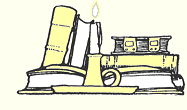
This page links to essays I have written and would like to share:
Aphorisms collected over the years.
Infrequently Asked Questions on Creation and Evolution was originally written for the now-defunct Science and Christianity mailing list, moderated by Steven H. Schimmrich, which you might find traces of in a search of the Web.
Thoughts on Evolution collects my reflections on the evolution/creation issue.
A brief overview of Christian Theology, originally written for an on-line philosophy forum.
The Argument from Design was also written for the on-line philosophy forum.
Thoughts on the Problem of Evil was written for a private discussion list run by Jim Burrows and Jon Callas, when life was going through a bleak time.
Salvation, a short essay on how I understand salvation to work.
The Figure of the Samaritan, pointing out a doctrinal side of the parable.
Animal Souls, on why all dogs go to heaven.
The Perennial Philosophy is a short look at what Leibnitz, Huxley, and other major thinkers have thought was the common core of major religions.
Detachment is from some exchanged about the subject on a net forum long ago.
Pray for Salt is about feeling free to pray for small things.
The Western Creed, by Charles Tart, should be more properly called "the materialist creed" and his summation of that position, the polar opposite of the Perennial Philosophy.
Atheist Morality looks at the contention that atheism undermines morality. Depends on the kind of atheism and what you do with it.
A study of the book of Revelation, in five parts:
Letters to the Seven Churches in Modernity
The Tree of Life gives my amateur understanding of the most metaphysical part of Kabbalah.
The One Metaphysics that everyone believes in, no matter what.
The Mind/Body Problem gives my reasons for believing awareness cannot be explained reductively, as for example by materialism.
The Literary Life examines life as a living piece of text.
Esthetic Taxonomies reviews what little I know about the theory of beauty.
Lessons of History are political principles one can learn by seeing the awful things that happen when those principles aren't used. I'm not much of a political philosopher, so I don't claim any great or original profundity for this.
Gay Marriage gives my opinion on the issue.
Polarization: a plague on both your houses.
The Problem of Susan: my view on the leading issue in the field of Narnia criticism.
Are the Narnia Chronicles Sexist (or Racist)? I say no.
Is Tolkien racist? I say no.
Was Frodo gay? I say no.
Are the Narnia books or Lord of the Rings allegorical? No.
A review of New Learning and New Ignorance by C. S. Lewis, his capsule summary of the mind-set of 16th-century England.
A review of Homo Ludens by Johan Huizinga, a famous survey of the element of play in cultural history.
A review of The Idea of the Holy by Rudolf Otto, a foundational work on religious psychology that introduced the term "numinous."
A review of The Exodus Happened 2450 B.C. by Gerald E. Aardsma, which seeks to reconcile the Exodus account with modern archeology.
A review of Beast and Man: The Roots of Human Nature by Mary Midgley, in which she takes to task unrealistic views of animals and how they relate to humans.
A review of Evolution as a Religion: Strange Hopes and Stranger Fears by Mary Midgley, in which she takes to task the unwarranted use of evolutionary theory as a guide to metaphysics and ethics.
A review of Quantum Reality by Nick Herbert, picking apart the several interpretations of quantum mechanics.
A review of The Emperor's New Mind by Roger Penrose, primarily on the question of whether machines can think as well as humans can, but also surveying much of modern physics and mathematics.
A review of Evolution from Space by Fred Hoyle and Chandra Wickramasinghe, a pair of highly qualified but highly maverick scientists who believed in panspermia, the idea that life came to Earth as microbes drifting down from space.
A review of Four Billion Years, by William F. Loomis, a book about the origins and early evolution of life.
A review of The Occult Underground and The Occult Establishment by James Webb, a two-volume historical survey of occultism in the west, in the 19th and 20th centuries.
A review of History in English Words by Owen Barfield, a book on how the history of language intertwines with the history of thought.
A review of Centuries of Childhood by Phillipe Aries, the first social history of the concept and treatmentof childhood through European history, still controversial.
A review of Class by Paul Fussell, an entertainly cynical book on the American class system.
Notes on Machiavelli's Discourses. Say "Machiavelli" and everyone thinks of The Prince, but I ran across his Discourses on the First Ten Books of Titus Livy in a public library and liked them better.
A review of Anselm's Discovery: A Re-Examination of the Ontological Proof for God's Existence, by Charles Hartshorne.
A review of The Art of War, by Sun Tzu.
This is a series of articles on the planets of the Solar System, originally written for my blog at Manchester Science Examiner. Anyone with an interest in science can recite the planets in their order from the Sun, and most could probably give a general description of each of them. But I think it's easy to dismiss them as simple, dull balls of rock or gas. In fact, each is a world, as rich in intriguing geological features as Earth. It's just that we are only now beginning to discover them.
The Philosophy Museum is a little jeu d'esprit I wrote for a philosophy forum I belonged to some years back.
The museum is still accepting donations....
Decorative Fringe: You may find that the following imaginary groups and characters bear some relation to real ones.
Gleanings from the internet:
Return to Wind Off the Hilltop
Copyright © Earl Wajenberg, 2025
Send comments to EarlWajenberg@comcast.net